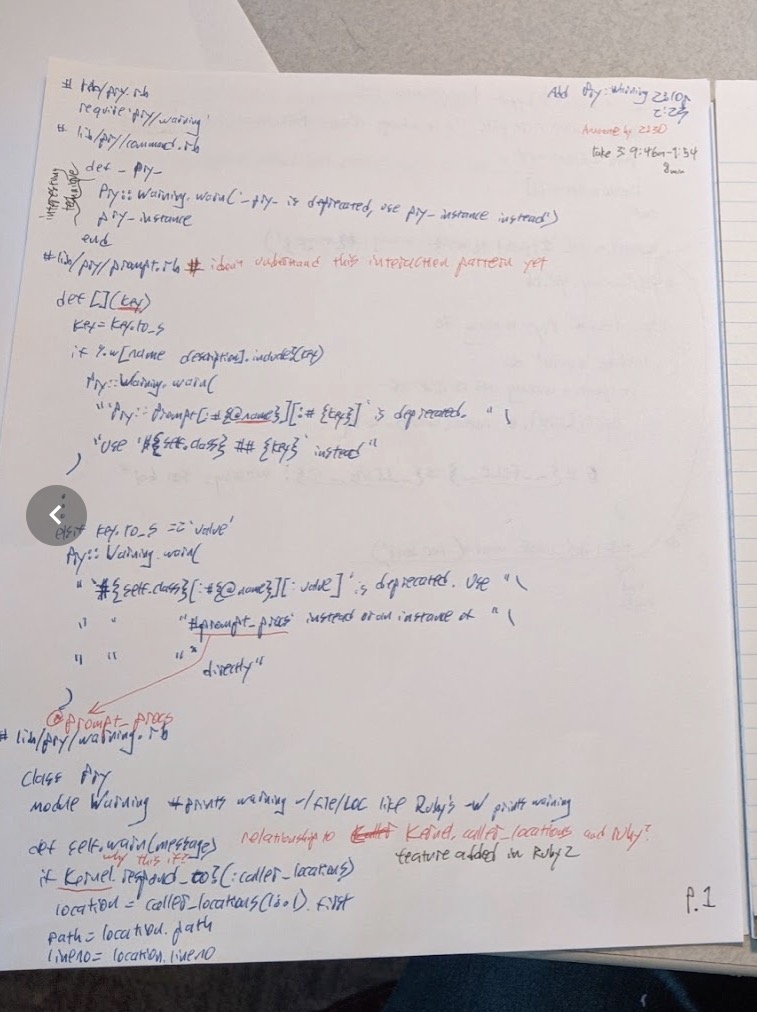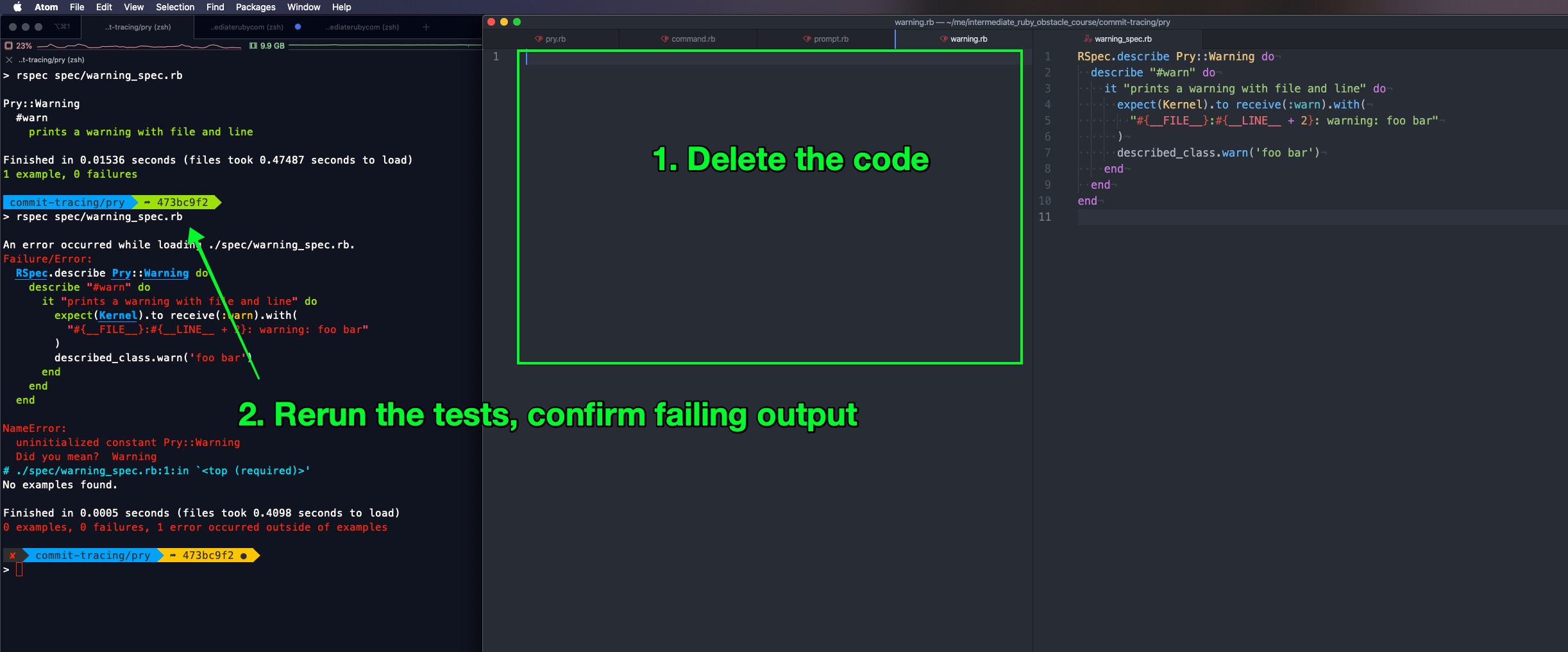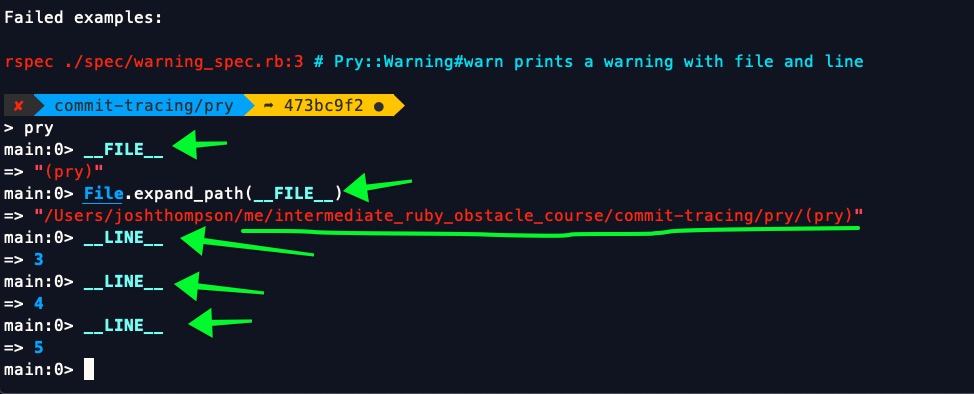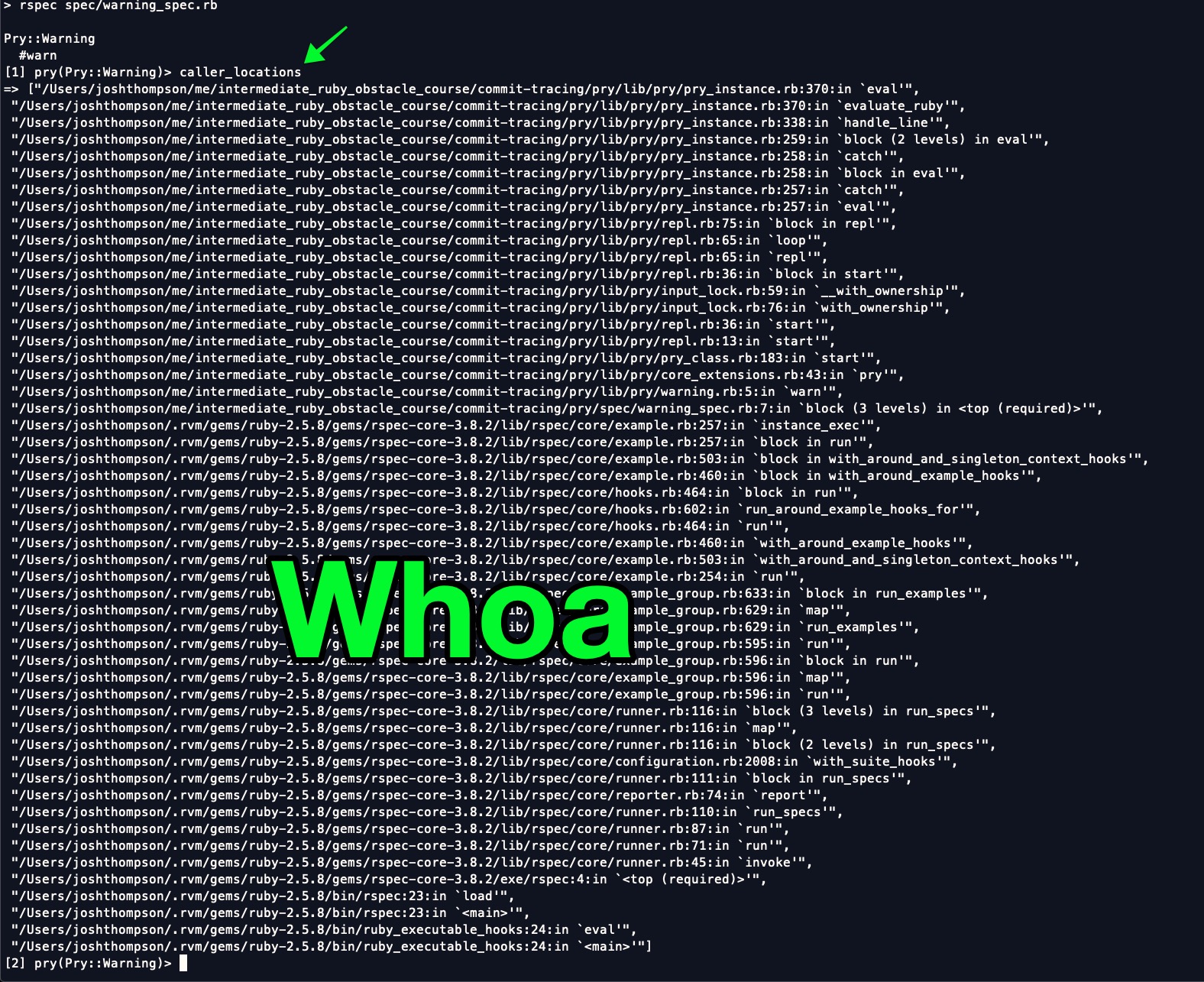Commit Tracing In Pry (Part 3)
- How Done Is This Post?
- Step 1: Navigate to the correct commit
- Step 2: Write down that commit on a piece of paper
- Step 3: Annotate that hand-written code
- Step 4: Keep the test, re-build
prompt.rb: - Delete the test, re-write the test and the class
- Step 5 Reset the repo to before this commit
- Step 6 Refactor the existing codebase to use
Pry::Warning::Warn - Checks for Understanding
- Questions
- Footnotes
How Done Is This Post? #
Anything I write ranges from “super rough notes-as-i-go, don’t even expect full sentences” to “this post is done and proven to deliver what it promises to deliver”
- Scratch-pad, take-notes-as-I-go scratch pad notes here: Commit Tracing In Pry, notes
- Review post, clean up for first ‘share’
- I
mkdirnew directory, follow my own steps, clarify <– we are here - Integrate feedback/answer questions from others
- Final cleanup, post is considered
doneunless someone reaches out with further questions
- Part 1: Commit Tracing in Pry (part 1)
- Part 2: [Commit Tracing in Pry (part 2)]
- Part 3: (you’re reading this right now)
I’ve now practiced “commit tracing” in the pry gem several times on a single commit, to prepare parts 1 and 2 of this series.
Now I’m trying a whole new (slightly modified) commit tracing exercise on another commit
I spent a few hours working struggling through commit tracing once. PLEASE go read the companion post, at least the first few main points of part 1 and 2.
We’re stepping the complexity of the commit up quite a bit. Check it out:
Read the associated PR
This looks perfect for us to practice upon!
Step 1: Navigate to the correct commit #
Navigate to where you’ve got pry, perhaps cloan it down inside of a commit-tracing directory?
mkdir commit-tracing
cd commit-tracing
git clone https://github.com/pry/pry
cd pry
atom .
Now that you’ve got the code cloned down, you’ll have to navigate to the right spot of the repository:
git co 473bc9
Confirm that the commit is what we expect (adding all the code in the PR):
git diff HEAD~
Cool. Lets open it up in Atom:
atom .
Then open up the desired files in Atom, either via the fuzzy finder or in your terminal:
git diff HEAD~ --name-only | xargs atom
Step 2: Write down that commit on a piece of paper #
Now, lets write out the commit on paper. I think I’m going to only write down the added code. TBD if this is the right approach:
OK, 13 min later, here’s what I wrote:

Step 3: Annotate that hand-written code #
Now, I’ll annotate it. The process of writing it out brought me quite a bit “closer” to it. I now have a grasp of what portions of it made sense to me, and what portions didn’t make sense.
I understand lots of the primitive bits of the ruby, but nearly nothing else.
First, underlining things in red that I have questions with, doodling notes elsewhere. I used two pens (red and black) and these additions took about 7 minutes, and increased my understanding of exactly what’s going on quite a bit.
Step 4: Keep the test, re-build prompt.rb: #
Step 4.0: Confirm tests pass #
rspec spec/warning_spec.rb
Step 4.1: Delete lib/warning #
Here’s the beginning of this step:

Step 4.2: rerun the test, confirm it’s failing #
And finishing the step:

Step 4.3: tdd your way through this as best as you can #
For example, you know how to fix uninitialized constant Pry::Warning:
class Pry
module Warning
end
end
I already know it’ll next throw a method not found, so lets just add that:
class Pry
module Warning
def self.warn(message)
end
end
end
Now I have no idea… running the test:
rspec spec/warning_spec.rb
Pry::Warning
#warn
prints a warning with file and line (FAILED - 1)
Failures:
1) Pry::Warning#warn prints a warning with file and line
Failure/Error:
expect(Kernel).to receive(:warn).with(
"#{__FILE__}:#{__LINE__ + 2}: warning: foo bar"
)
(Kernel).warn("/Users/joshthompson/me/intermediate_ruby_obstacle_course/commit-tracing/pry/spec/warning_spec.rb:7: warning: foo bar")
expected: 1 time with arguments: ("/Users/joshthompson/me/intermediate_ruby_obstacle_course/commit-tracing/pry/spec/warning_spec.rb:7: warning: foo bar")
received: 0 times
# ./spec/warning_spec.rb:4:in `block (3 levels) in <top (required)>'
Yeah, makes sense, I never bubbled anything up to Kernal#warn checking the docs
class Pry
module Warning
def self.warn(message)
Kernal.warn(message)
end
end
end
Hah, I cannot spell Kernal correctly…
rspec spec/warning_spec.rb
Pry::Warning
#warn
prints a warning with file and line (FAILED - 1)
Failures:
1) Pry::Warning#warn prints a warning with file and line
Failure/Error: Kernel.warn(message)
Kernel received :warn with unexpected arguments
expected: ("/Users/joshthompson/me/intermediate_ruby_obstacle_course/commit-tracing/pry/spec/warning_spec.rb:7: warning: foo bar")
got: ("foo bar")
# ./lib/pry/warning.rb:4:in `warn'
# ./spec/warning_spec.rb:7:in `block (3 levels) in <top (required)>'
OK, so the expected strings are different. We want file_path:line-number: warning: <message>
Way back when, I was trying to TDD my way through the Rake gem. I wrote about it here: Deliberate Practice in Programming with Avdi Grimm and the Rake gem
I remember encountering __LINE__ and __FILE__ from that. Re-reading it to refresh my memory…
(So far, I’ve not glanced at my piece of paper with the “answers” for this method. I’m moving right along, not losing any time to unproductive struggle.)
the File class can help us here. File#expand_path. Fire up a pry session in your terminal and try running __FILE__, __LINE__, etc:

Not too complicated. Lets use a little string interpolation to get us closer to our desired output:
class Pry
module Warning
def self.warn(message)
msg = "#{__FILE__}:#{__LINE__}: #{message}"
Kernel.warn(msg)
end
end
end
Yep, very close. Here’s our actual/intended output:
expected: "/Users/joshthompson/me/intermediate_ruby_obstacle_course/commit-tracing/pry/spec/warning_spec.rb:7: warning: foo bar"
got: "/Users/joshthompson/me/intermediate_ruby_obstacle_course/commit-tracing/pry/lib/pry/warning.rb:6: foo bar"
I’ll simplify the output to make it more readable.
expected: "./commit-tracing/pry/spec/warning_spec.rb:7: warning: foo bar"
got: "./commit-tracing/pry/lib/pry/warning.rb:6: foo bar"
OK, we can close most of this gap easily:
class Pry
module Warning
def self.warn(message)
msg = "#{__FILE__}:#{__LINE__ + 1}: warning: #{message}"
Kernel.warn(msg)
end
end
end
expected: ("./commit-tracing/pry/spec/warning_spec.rb:7: warning: foo bar")
got: ("./commit-tracing/pry/lib/pry/warning.rb:7: warning: foo bar")
So, the source of the file is coming back wrong.
It’s showing to have been generated in warning.rb, but really it should be reported as coming from the warning_spec file.
I’ve gotten this far without looking at my notes, but now I’m going to take a look.
There’s this caller_locations thing I need to examine… we’ll stick a pry in our new method, and explore caller_locations.

Oh, that reminds me of this clean_caller thing I dealt with long ago…
TODO: embed tweet to clean_caller thing in pry
https://twitter.com/josh_works
In my ~/.pryrc, I have:
Pry.config.commands.command 'caller_clean', 'show call stack with lines mentioning "gem" removed' do |foo|
output.puts caller.reject {|l| l.include?('/gems')}.join("\n")
So… I’ve interacted with the caller before. I can use it in pry, and call caller_clean and it “cleans up” the output
Anyway, I stuck a pry in the Pry::Warning::warn method, like so:
class Pry
module Warning
def self.warn(message)
require "pry"; binding.pry
# 'breaking' the code here is messing with my output
msg = "#{__FILE__}:#{__LINE__ + 1}: warning: #{message}"
Kernel.warn(msg)
end
end
end
This is messing with my test output, since I’m trying to generate a caller entry from warning_spec.rb. Lets take the pry out of warning.rb and move it here:
RSpec.describe Pry::Warning do
describe "#warn" do
it "prints a warning with file and line" do
require "pry"; binding.pry
expect(Kernel).to receive(:warn).with(
"#{__FILE__}:#{__LINE__ + 2}: warning: foo bar"
)
described_class.warn('foo bar')
end
end
end
Let’s see what __FILE__ is:
> __FILE__
=> "(pry)"
Also take a look at caller. It reads top-to-bottom, doesn’t match up with the desired output as far as I can tell…
Hm. Taking a look at my notes now…
caller_locations(1..1)
Hm. OK, in the pry session, I’m calling (and examining):
caller_locations
caller_locations(1..1)
caller_locations(1..1)
caller_locations.first
So now I’m updating my warning.rb to be:
class Pry
module Warning
def self.warn(message)
location = caller_locations.first
# __FILE__ and `caller_locations.first` are the same?
msg = "#{location}:#{__LINE__ + 1}: warning: #{message}"
Kernel.warn(msg)
end
end
end
Getting close:
Kernel received :warn with unexpected arguments
expected: ("pry/spec/warning_spec.rb:7: warning: foo bar")
got: ("pry/spec/warning_spec.rb:7:in `block (3 levels) in <top (required)>':8: warning: foo bar")
So, now the path is correct. Win. I… don’t know what to do about the error message, though.
glances at notes
Ah, I guess I should examine locationand caller_locations a bit more in pry…
[4] pry> location = caller_locations.first
=> "/Users/joshthompson/me/intermediate_ruby_obstacle_course/commit-tracing/pry/lib/pry/pry_instance.rb:370:in `eval'"
[5] pry> location.class
=> Thread::Backtrace::Location
[6] pry>
Oh. So… this caller_locations thing looked like an array of strings, but it’s actually an array of Thread::Backtrace::Location objects.
location.methods
Try calling some of these methods…

OK. Now, working this back into the warning.rb class, futzing around with adding + 1, + 2, adding/removing the pry from warning_spec.rb, in order to evaluate the output:
class Pry
module Warning
def self.warn(message)
location = caller_locations.first
# __FILE__ and `caller_locations.first` are the same?
path = location.absolute_path
lineno = location.lineno
msg = "#{path}:#{lineno}: warning: #{message}"
Kernel.warn(msg)
end
end
end
Here’s some of the error messages I was getting on the way:
expected: ("commit-tracing/pry/spec/warning_spec.rb:7: warning: foo bar")
got: ("commit-tracing/pry/spec/warning_spec.rb:8: warning: foo bar")
expected: ("commit-tracing/pry/spec/warning_spec.rb:7: warning: foo bar")
got: ("commit-tracing/pry/spec/warning_spec.rb:9: warning: foo bar")
And with the above code, the test passes!
Woot.
I’m not going to worry about the ruby 1.9 support if/else. ruby 2.0.0 came out in 2015, and I kinda doubt that people are still running ruby 1.9.
I also don’t want to do rvm install ruby 1.9.0, deal with configuring my machine to run ruby 1.9.
We can see that both of these approaches would work though. I hopped back into pry, called caller.first.split(':'), etc. Explore it yourself. I don’t know what to make of it.
delete the code, rebuild it all again
Step 4.4: tdd your way through this again #
OK, take a long break. Do it again. Try to not look at your paper this time. I’m not going to need it, I don’t think…
A little bit of running the tests, and I’m here:
class Pry
module Warning
def self.warn(message)
caller = caller_locations.first
file = caller.absolute_path
msg = "#{file} #{message}"
Kernel.warn(msg)
end
end
end
The output is almost right…
A little more work, and the tests pass, with:
class Pry
module Warning
def self.warn(message)
caller = caller_locations.first
file = caller.absolute_path
lineno = caller.lineno
msg = "#{file}:#{lineno}: warning: #{message}"
Kernel.warn(msg)
end
end
end
This 2nd rebuild took about… 4 minutes. Maybe 5. Didn’t look at my paper once. I’m going to go with this dramatically simplified implementation of this class.
I re-ran all the tests, and got some failures. Let me add this if/else case and see if they pass…
Nope, still fails. OK, don’t know why they, but not worrying about it.
A little refactor brings us to:
class Pry
module Warning
def self.warn(message)
caller = caller_locations.first
file = caller.absolute_path
lineno = caller.lineno
Kernel.warn("#{file}:#{lineno}: warning: #{message}")
end
end
end
I’m content with this.
Delete the test, re-write the test and the class #
Just like before, select everything in the warning_spec.rb and warning.rb files, rebuild it, running tests as you go.
had to look at the page to refresh myself on what to name it
got a little farther, still don’t have an MVP test, looking at my paper again
Here’s my MVP test, deviated slightly from what was written, but I grok this:
RSpec.describe Pry::Warning do
describe "#warn" do
it "should get a message" do
expect(Kernel).to receive(:warn).with(
"blarg"
)
Pry::Warning.warn('blarg')
end
end
end
Run the tests, get things like no class, no method, and now it passes, like so:
(I am so bad at spelling Kernel. el, not al)
class Pry
module Warning
def self.warn(message)
Kernel.warn(message)
end
end
end
Let’s make our tests a bit better:
RSpec.describe Pry::Warning do
describe "#warn" do
it "should get a message" do
expect(Kernel).to receive(:warn).with(
"#{__FILE__}:#{__LINE__}: warning: blarg"
)
Pry::Warning.warn('blarg')
end
end
end
Now things fail again, so make it pass.
class Pry
module Warning
def self.warn(message)
caller = caller_locations.first
file = caller.absolute_path
lineno = caller.lineno
Kernel.warn("#{file}:#{lineno}: warning: #{message}")
end
end
end
OK, now the test fails again:
1) Pry::Warning#warn should get a message
Failure/Error: Kernel.warn("#{file}:#{lineno}: warning: #{message}")
Kernel received :warn with unexpected arguments
expected: ("/Users/joshthompson/me/intermediate_ruby_obstacle_course/commit-tracing/pry/spec/warning_spec.rb:5: warning: blarg")
got: ("/Users/joshthompson/me/intermediate_ruby_obstacle_course/commit-tracing/pry/spec/warning_spec.rb:8: warning: blarg")
Notice the difference - the line number is wrong. We can see where we’re going wrong, look at the line numbers of the spec!
Subtract the 5 from the 8, and that’s the expected difference in where the actual Kernal.warn(message) message is sent, vs where __LINE__ is in the file when it’s called.
And… you can play around to get it to work:
RSpec.describe Pry::Warning do
describe "#warn" do
it "should get a message" do
expect(Kernel).to receive(:warn).with(
"#{__FILE__}:#{__LINE__ + 2}: warning: blarg"
)
Pry::Warning.warn('blarg')
end
end
end
Sick. I rebuilt this test and got it working in not many minutes. Lets try it again, see if I can do it without paper notes.
Step 4.5: rebuild the test (and the library) a second time #
Start fresh again:
Ended up with:
RSpec.describe Pry::Warning do
describe "#warn" do
it "should return path, line number, message" do
expect(Kernel).to receive(:warn).with(
"message"
)
Pry::Warning.warn("message")
end
end
end
No notes needed, off to make it pass
30 seconds later, it passes. Lets update the test:
RSpec.describe Pry::Warning do
describe "#warn" do
it "should return path, line number, message" do
expect(Kernel).to receive(:warn).with(
"#{__FILE__}:#{__LINE__ + 2}: warning: message"
)
Pry::Warning.warn("message")
end
end
end
Make it pass…
other than forgetting that the method is absolute_path, and not absolute_url, this was easy.
I did it all with good process, in just three or four minutes.
Step 5 Reset the repo to before this commit #
You’ll end up rebuilding this one more time, should take only 4 minutes, and you’ll also get to now make the refactors included in this PR. I’m still avoiding looking at my paper
git stash
git reset --hard HEAD~
Step 6 Refactor the existing codebase to use Pry::Warning::Warn #
So… I’m not sure how to find the files that need refactoring.
Obviously I’ve got the names in the PR, but if I were doing this myself, how would I find them? It’s likely that this class is going to replace some existing method calls, maybe to Kernel directly?
I kinda combined steps 5 and 6 together, sorry for the confusion.
Now that the repo is reset to before this PR, re-add the test, make it pass, and then lets find the refactoring opportunities…
OK, that took me about 4 minutes to rebuild, completely. I’m feeling comfortable with this now…
For the refactor… I give up. I don’t know how I would have found these…
ctrl-f-ing the entire repo for:
Kernel.warn(nothing)warn(lots of things. 120 results, 30 files).warn(6 results, 4 files. )warn(this is the key search wherry to find the refactors?
Checks for Understanding #
From round 1, rebuilding warning.rb #
- what is
caller? - what is
__LINE__? - what is
__FILE__? - what does
caller_locationslook like? What are some of it’s methods. - why might you use
caller_locationsinstead of__FILE__inPry::Warning::Warn
OK. I had to study it a bit, the finished PR, and the refactors I was just doing, in order to make each exact change.
I’m now understanding how all these pieces fit together, quite nicely.
I’m going to call it a day here, and I’ll come back and repeat this entire PR, from scratch, without looking at my paper or the actual changed code, and I’ll see if I can get the whole thing done.
I’ll start from:
git reset --hard 473bc9f2d6a0ebd93c9a09ea3c699c14e01330b0~
git clean --dry-run
git clean -f
Look up git clean (tldr git clean) to get a feel for how it works.
PHEW! Taking a break for a while now.
Questions #
- how does
#warnwork as implemented before the commit? - take notes as reading the changes